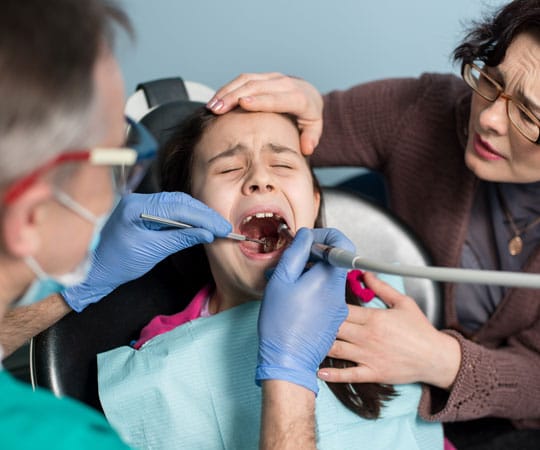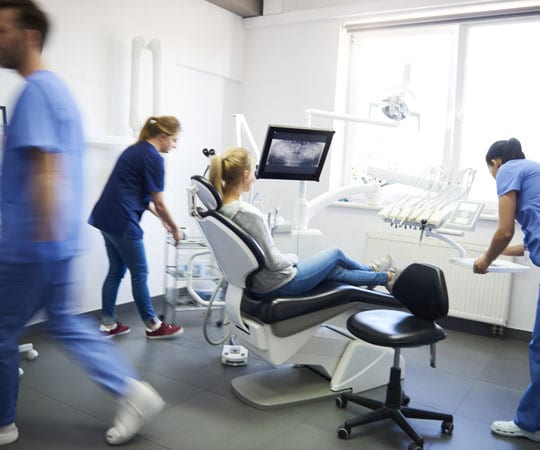What is Emergency Dentistry?
A dental emergency is any issue involving the teeth and its supporting structures in the oral cavity, requiring the immediate attention of a dentist or other relevant health professional. Dental emergencies usually present with toothache (tooth pain) which may originate from the tooth or gum and may radiate to the shoulders. Toothache is basically caused when the nerve root of a tooth is irritated as a result of a dental infection, tooth decay, gum infection (gingivitis) or dental fracture.
Other dental emergencies following previous restorative dental procedures include lost or broken fillings, broken crowns, dentures and implants, etc. These situations require the immediate attention of a dentist.

What To Do in case of a Dental Emergency?
If you ever find yourself in an acute traumatic condition involving your teeth, you need to find an emergency dentist near you quickly! Dental emergencies generally present as tooth pain and are usually due to an underlying dental infection, or a physical accident resulting in an injury to the tooth or existing dental crown or bridge. A dental emergency requires the attention of a qualified dentist as soon as possible, to prevent an escalation and complications.
If your emergency is life-threatening, go immediately to a hospital emergency room or dial 911 for Emergency Medical Services. However, ER attendants usually cannot carry out any proper dental diagnoses and treatments. This implies that after your long wait in the ER, you would likely only get painkillers that soothe the pain without addressing the underlying causative factors. Conversely, an emergency dentist will help you understand what may be causing the toothache and how to permanently correct it.
At Bellevue Azalea Dentistry, we are an emergency dental care provider for the whole family. Accidents happen in life and we can help stop the pain. You can find information about toothache from the Bellevue Azalea Dentistry, including potential causes, symptoms, treatment options and home management tips. The key to proper management of a dental emergency is to understand what may be causing tooth pain and how best to remedy it immediately.

Emergency Room (ER) for Tooth Pain
Yes, you can. As with most other medical emergencies, an ER visit is appropriate if you are experiencing tooth pain.
However, since an ER doctor isn’t a dentist, you may not get the best dental care at an emergency room for your tooth problem. ER attendants are usually not adequately equipped for proper diagnosis and treatment of dental issues. They are very likely to simply prescribe pain killers which temporarily allay the symptom but do little to resolve the underlying dental problem, e.g. tooth or gum infection.
Your best bet for dental emergencies like toothaches remains a dentist. If you reside in and around Bellevue and have a dental emergency such as toothache, a Dentist is just a phone call away!
Causes Of Tooth Pain
Tooth pain arises when the nerve endings in the pulp of a tooth are irritated by pressure, infection, inflammation or injury. A quick revision of basic tooth anatomy will help us understand this better.
A tooth is made up of:
- the external rock-hard enamel (strongest mineral in the body),
- the calcareous dentin,
- the pulp (softer, innermost living part housing nerves and blood vessels) and
- the cementum (holds the root of the tooth firmly to the gum and jaw), in addition to other supporting structures.
When the protective enamel is damaged by a tooth or gum infection or physical fracture, heat or cold enters the tooth through the microtubules of the dentin into the nerve endings of the pulp, irritating the nerves and causing pain or sensitivity.
Particular causes of tooth pain include:
- Tooth Decay: It is also known, in the dental world, as dental cavities or caries. Tooth decay is the damage to the enamel and dentin by bacteria living on the teeth and their acidic metabolic products. When we eat sugary and starchy foods, bacteria residing in our mouths turn them into acids. The bacteria, sugars, acid and saliva mix to form a yellow matrix on the tooth surface called plaque. The acid in this plaque eats away at the enamel of the tooth, producing holes known as cavities. These cavities expose the pulp of the tooth and its nerve endings, resulting in sensations of pain. If untreated, the bacteria may spread into the root canal.
- Root Canal Infection: This refers to an infection of the pulp of the tooth which houses the root canal – nerve endings, blood vessels and connective tissues. It may arise from an uncontrolled tooth decay, periodontal disease, or a tooth fracture. This infection and consequent inflammation of the root canal is usually very painful and requires immediate dental attention to prevent a dental abscess. Usually, a root canal therapy is carried out during which the entire (infected) pulp is removed and the resulting hollow is irrigated with a sterilizing liquid, and filled.
- Gum Infection: Plaque and tartar buildup may cause the gum to become red and inflamed at the surface, a condition known as gingivitis. This can cause tooth pain. Untreated gingivitis may lead to periodontitis.
- Fractured Tooth: A fracture exposes the pulp of the tooth to immense pressure, producing severe pain. This may be treated by reattaching the broken piece of enamel, or with the use of dental filling or crown. Tooth extraction may also be required.
- Dentin Hypersensitivity: Some people genetically have thin enamels, resulting in hypersensitive dentins. Others develop sensitive teeth through poor oral hygiene and sugary diet. Either way, sensitive teeth can cause pain when you eat extremely hot or cold food. This may be corrected with improved oral hygiene and the use of specialized oral hygiene products.
- Dental Abscess: The pulp of the tooth may get infected if dental cavities and gum infections are left untreated. The resulting root canal infection, if untreated, may spread through the entire pulp and result in a dental abscess. An endodontist is a dentist who specializes in the diagnosis and treatment of dental abscesses. The treatment usually involves antibiotics, anti-inflammatory drugs and dental surgery.
- Jaw Pain
- Cosmetic dental problems, especially in the front visible teeth.
- Broken or chipped dental crowns or dental bridges.
- Broken or chipped veneers.
Investigations For Toothache
When you visit the dental clinic, your dentist may physically examine your mouth, teeth, gums, jaws, tongue, throat, sinuses, ears, nose and neck. Next, the dental technician will take x-rays of each tooth to enable the dentist properly assess your condition. Then the dentist comes up with a treatment plan to treat the injury or underlying infection which may include one or more of the following:
- root canal treatment,
- tooth extraction,
- periodontal treatment or
- the use of dental crowns and bridges.
A dental crown is a tooth-shaped cap that is cemented over a tooth to restore its structure and integrity. It is used in cases of severe tooth decay or dental fractures. Dental bridges are a similar kind of dental appliances used to “bridge” the gap created by a lost or extracted tooth. Your dentist will discuss these options with you, if necessary. Your dentist will also determine if you need painkillers, antibiotics and other relevant drugs, and prescribe accordingly.
Fastest Way to Stop Toothache at Home
In addition to over-the-counter pain killers, certain natural remedies have been very effective for the management of tooth pain at home. These home treatments include:
- OTC analgesics e.g. acetaminophen, ibuprofen.
- Salt water rinse: salt water has anti-inflammatory and anti-infective effects, and may help heal oral wounds. To prepare a salt water rinse, dissolve half a teaspoon of salt in a glass of warm water and use as a mouthwash.
- Cold Compress: Applying cold to the skin constricts the blood vessels in the area, reducing pain and inflammation. To use this, put an ice-pack in a towel and apply for no more than 10-20 minutes at a time.
- Clove Oil: It contains eugenol, a natural antiseptic. Dab a little clove oil on some cotton wool and apply to the affected tooth.
- Hydrogen Peroxide Rinse: H2OH possesses established antibacterial and anti-inflammatory properties. To prepare a mouthwash, mix 3% Hydrogen Peroxide with equal part of water.
Others include garlic, vanilla extract, guava leaves, thyme, etc.
How does treatment work:
- Doctor will examine your teeth and provide consultation
- If necessary, appropriate x-rays will be taken to understand teeth and bone structure near the tooth
- Treatment plan will be discussed along with the insurance coverage.
- Book an appointment or call us at to schedule a consultation with the doctor.
- (425)998-8109
LET US HELP PROVIDE BEST Dental Emergency
Dental Emergency are completely safe and prevent permanent bone loss in your teeth. Dental Emergency help you get a beautiful smile.
frequently asked question
Throbbing tooth pain is usually indicative of tooth damage/pathology. It may be caused by tooth decay or a cavity. A toothache may also be caused by an infection of the tooth, gum, or other dental supporting structures. A throbbing toothache indicates a dental anomaly and warrants an immediate visit to your dentist.
Does Insurance Cover Emergency Dental?
You might wonder if emergency dental is expensive. Well, not really. Emergency dental is typically covered by dental insurance. This makes it more cost-effective than going to ER.
Rarely, some tooth decays presenting at the clinic is so severe that tooth extraction becomes inevitable. Your dentist will determine if this is the way to go.
Related Post About Dental Emergency
Emergency Care for Your Toothache Most toothaches are unannounced. There are plenty of Home remedies for temporary pain relief while you wait for your consultation.
What To Do In A Dental Emergency A Dental Emergency Can Affect Any Part Of The Oral Cavity, Including The Gums, Soft Tissues, Jaw, And Teeth.
Emergency Dentistry Visits For Common Tooth Accidents An Emergency Dentistry Office Is Accustomed To Repairing Trauma To Teeth.
Why You Should Avoid The Er For Emergency Dental Care It Is Also Important For Patients To Avoid The Need For Emergency Care By Practicing Proper Oral Hygiene As Well As Scheduling Routine Exams.
